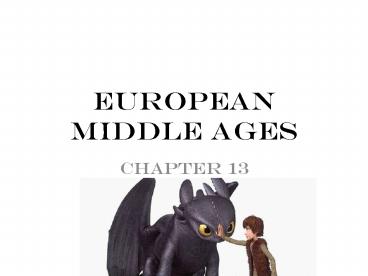European Middle Ages - PowerPoint PPT Presentation
1 / 22
Title:
European Middle Ages
Description:
European Middle Ages Chapter 13 Section 2- Feudalism in Europe ATTACK Invaders Attack Western Europe- The Vikings Invade from the North Originally from ... – PowerPoint PPT presentation
Number of Views:75
Avg rating:3.0/5.0
Title: European Middle Ages
1
European Middle Ages
- Chapter 13
2
Section 2- Feudalism in Europe
3
ATTACK
- Invaders Attack Western Europe-
- The Vikings Invade from the North
- Originally from Scandinavia
- Also known as Norsemen, were Germanic people
- Worshiped war like Gods and had brutal nicknames
- Ex. Eric Blood Axe and Thorfinn Skullsplitter
4
Im Sailing
- Vikings attacked with terrifying speed
- Carried swords and shields won and moved on
- Viking War Ships
- Massive
- Largest held 300 warriors and had 72 oars
- Carving of a sea monster on the front of the
ship - Could weigh up to 20 tons fully loaded
- Needed only three feet of water
5
(No Transcript)
6
- Vikings were warriors, traders, farmers and
explorers - Viking explorer Leif Ericson reached North
America around 1,000 AD (500 years before
Columbus) - Vikings accepted Christianity and stopped raiding
monasteries - Better farming conditions less need for Viking
lifestyle
7
- Magyars and Muslims Attack from the East and
South- - Magyars- Nomads attacked from the east
- Attacked villages and monasteries
- Did not settle in conquered land, took slaves and
sold them - Muslims- Struck from the south
- Came up from Africa headed towards Spain and
Italy - Goal was to attack and plunder
8
800 1000 A.D. was a period of intense invasions
that disrupted life in Europe
and completely destroyed the former great
Carolingian Empire of the Franks.
Why were these invasions so threatening to Europe?
What lands did the Vikings raid?
9
Heres Looking at You Kid
- Attacks by Vikings, Magyars, and Muslims caused
widespread suffering - People now looked to local rulers rather than
kings
10
Resistance is Futile
- Feudalism-
- A system of governing and land holding
- Based on rights and obligations
- Lord- Offered land for military protection
- Fief- Land Grant
- Vassal- One receiving land
- Similar to what existed in China under the Zhou
Dynasty, and also in Japan
11
- Explain the mutual
- obligations of
- the feudal system.
Land-lord (noble) owns a Manor (huge estate of
land). He gives a grant of land (fief) to
someone who promises in exchange to provide
military protection to the lord and his family,
work the lords lands, and serve in other
ways. A person who receives land from a lord
is a vassal.
2. Why did the feudal system create
complicated alliances?
The same noble might be a vassal himself to
several different lords.
PP Design of T. Loessin Akins H.S.
12
Pyramid Scheme
- The Feudal Pyramid-
- 1.) King
- 2.) Vassals and Bishops
- 3.) Knights
- 4.) Peasants
13
The Feudal Pyramid
14
(No Transcript)
15
Get in Line
- Social Classes-
- 1.) Those that fought
- Knights, Nobles
- 2.) Those who prayed
- Men and Women of the Church
- 3.) Those who worked
- Peasants/Serfs (bound to the land)
16
3. Describe feudal social classes.
Those who fought nobles, knights, and
kings Those who prayed the Churchs Clergy
(priests, bishops, monks) Those who worked
Peasants (serfs)
Social class was usually inherited.
Those who fought
Those who prayed
Those who worked
PP Design of T. Loessin Akins H.S.
17
Manors The Economics of Feudalism
- Manors The lords estate
- Arrangement between lords and serfs
- Lords- Provided land, housing, and protection
- Serfs- Worked the land, cared for animals,
performed various tasks
18
(No Transcript)
19
(No Transcript)
20
Manors The Economics of Feudalism
- The Manor was a self sustaining community
- Peasants rarely moved more than 25 miles away
from the manor - Peasants produced crops, milk, cheese, fuel,
cloth, leather goods, and lumber - Outside purchases included salt, iron,
and millstones
21
Manors The Economics of Feudalism
- Peasants paid a heavy price to live on the Manor
- Paid a grain tax
- Marriage tax
- Tithe- Church tax (Paid by the lord and peasant)
- One tenth of their income
- Lived in small homes
- Accepted this lifestyle as part of the churchs
teachings
22
6. Explain why serfs accepted their economic
hardships.
They were taught by the Church and believed that
God determined a persons social position
before they were born. To leave the community
in which they were born would be questioning
Gods wisdom. And it was a sin to question the
Church!
PP Design of T. Loessin Akins H.S.































